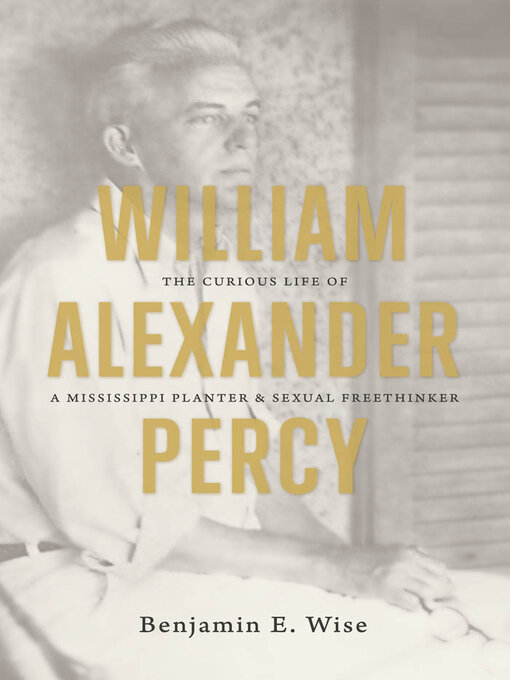William Alexander Percy
The Curious Life of a Mississippi Planter and Sexual Freethinker
We follow Percy as he travels from Mississippi around the globe and, always, back again to the Delta. Wise's exploration brings depth and new meaning to Percy's already compelling life story — his prominent family's troubled history, his elite education and subsequent soldiering in World War I, his civic leadership during the Mississippi River flood of 1927, his mentoring of writers Walker Percy and Shelby Foote, and the writing and publication of his classic autobiography, Lanterns on the Levee. This biography sets Percy's life and search for meaning in the context of his history in the Deep South and his experiences in the gay male world of the early twentieth century. In Wise's hands, these seemingly disparate worlds become one.
-
Creators
-
Publisher
-
Release date
March 12, 2012 -
Formats
-
Kindle Book
- ISBN: 9781469601908
-
OverDrive Read
- ISBN: 9781469601908
- File size: 3187 KB
-
EPUB ebook
- ISBN: 9781469601908
- File size: 3187 KB
-
-
Languages
- English
-
Reviews
-
Publisher's Weekly
April 9, 2012
Born to aristocratic parents in the Mississippi Delta just after the Reconstruction, William Alexander Percy grew up to be a poet, lawyer, and briefly a soldier in WWI, all the while trying to " out spaces of sexual freedom" to accommodate his homosexuality. Despite an acute awareness of his own difference, Percy played willing host to the racism of his forebears. But as Wise tells it, the great challenge of Percy's life was negotiating an identity that could reconcile notions of Southern manhood with what one newspaper of the day called the "open secret" of Percy's queerness. At times Wise describes mundane events in overwhelming detail, and occasionally he abruptly zooms out to address context. While jarring, these transitions speak to the difficulty of examining his subject, whose papers were heavily edited by his executor (his adopted son Roy), prompting Wise to posit that the pattern of the blanks "suggests that âloving father' and âhomosexual' was an incongruity his family could not reconcile." Nevertheless, the author skillfully reveals the extent to which Percy was able to sustain relationships with gay men, both abroad and at home. Wise is frank about the elitism and safety afforded by Percy's wealth, but he also highlights Percy's dedication to his adopted family and intellectual pursuits, rendering his subject a compellingly complex character. Halftone photos. -
Library Journal
March 1, 2012
There is no question that William Alexander Percy (1885-1942) led a fascinating life. Born to a wealthy Mississippi Delta family (his father was a U.S. senator, plantation owner, and lawyer), Will, as he was known, was educated at Sewanee and Harvard. He was also gay and a bit effeminate, at a time when to be so in the Deep South was extremely problematic. Nevertheless, he did not flee his hometown of Greenville; though he became a world traveler (he made an important contribution to President Herbert Hoover's mission for the relief of Belgium in 1915), he always returned. He held his region together during the great Mississippi flood of 1927. He was also deeply devoted to his family: after his favorite cousin died, he adopted the deceased's three sons, including future famous novelist Walker Percy. He himself was a published poet, and his autobiographical Lanterns on the Levee: Recollections of a Planter's Son (1941) became a bestseller. Wise reminds us that Percy, like many of his Southern compatriots, was very much a racist as well as, to some degree, a Southern nationalist. VERDICT This beautifully written biography will appeal to general readers as well as scholars of gay history and the South.--David S. Azzolina, Univ. of Pennsylvania Libs., Philadelphia
Copyright 2012 Library Journal, LLC Used with permission.
-
Formats
- Kindle Book
- OverDrive Read
- EPUB ebook
Languages
- English
Loading
Why is availability limited?
×Availability can change throughout the month based on the library's budget. You can still place a hold on the title, and your hold will be automatically filled as soon as the title is available again.
The Kindle Book format for this title is not supported on:
×Read-along ebook
×The OverDrive Read format of this ebook has professional narration that plays while you read in your browser. Learn more here.


